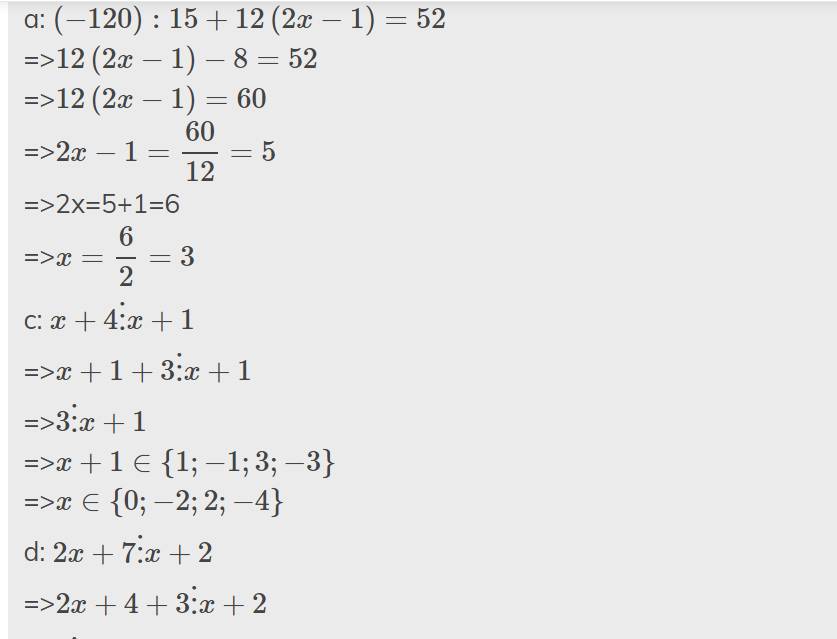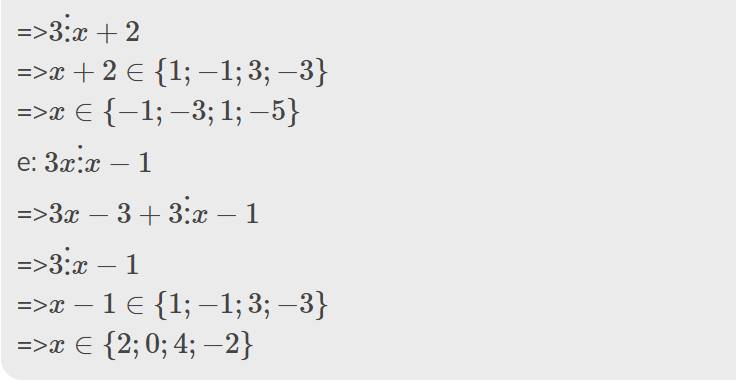2x+2x+1+2x+2+2x+3=120 . Tìm x
Hãy nhập câu hỏi của bạn vào đây, nếu là tài khoản VIP, bạn sẽ được ưu tiên trả lời.


a: \(\left(-120\right):15+12\left(2x-1\right)=52\)
=>\(12\left(2x-1\right)-8=52\)
=>\(12\left(2x-1\right)=60\)
=>\(2x-1=\dfrac{60}{12}=5\)
=>2x=5+1=6
=>\(x=\dfrac{6}{2}=3\)
c: \(x+4⋮x+1\)
=>\(x+1+3⋮x+1\)
=>\(3⋮x+1\)
=>\(x+1\in\left\{1;-1;3;-3\right\}\)
=>\(x\in\left\{0;-2;2;-4\right\}\)
d: \(2x+7⋮x+2\)
=>\(2x+4+3⋮x+2\)
=>\(3⋮x+2\)
=>\(x+2\in\left\{1;-1;3;-3\right\}\)
=>\(x\in\left\{-1;-3;1;-5\right\}\)
e: \(3x⋮x-1\)
=>\(3x-3+3⋮x-1\)
=>\(3⋮x-1\)
=>\(x-1\in\left\{1;-1;3;-3\right\}\)
=>\(x\in\left\{2;0;4;-2\right\}\)

a) \(\left(x-1\right)^3=8=2^3\)
\(x-1=2\)
\(x=2+1=3\)
b) \(7^{2x-6}=49=7^2\)
\(2x-6=2\)
\(2x=6+2=8\)
\(x=8:2=4\)
c) \(\left(2x-14\right)^7=128=2^7\)
\(2x-14=2\)
\(2x=14+2=16\)
\(x=16:2=8\)
d) \(x^4\cdot x^5=5^3\cdot5^6=5^4\cdot5^5\)
\(x=5\)
e) \(3\cdot\left(x+2\right):7\cdot4=120\)
\(x+2=120:3\cdot7:4\)
\(x+2=70\)
\(x=70-2=68\)
Lời giải:
a. $(x-1)^3=8=2^3$
$\Rightarrow x-1=2$
$\Rightarrow x=3$
b. $7^{2x-6}=49=7^2$
$\Rightarrow 2x-6=2$
$\Rightarrow 2x=8$
$\Rightarrow x=4$
c. $(2x-14)^7=128=2^7$
$\Rightarrow 2x-14=2$
$\Rightarrow 2x=16$
$\Rightarrow x=18$
d.
$x^4.x^5=5^3.5^6$
$x^9=5^9$
$\Rightarrow x=5$
e.
$3(x+2):7=120:4=30$
$3(x+2)=30.7=210$
$x+2=210:3=70$
$x=70-2=68$


a: Ta có: \(3\left(2x-3\right)+2\left(2-x\right)=-3\)
\(\Leftrightarrow6x-9+4-2x=-3\)
\(\Leftrightarrow4x=2\)
hay \(x=\dfrac{1}{2}\)

a) 3x(4x-3)-2x(5-6x)=0
\(\Leftrightarrow12x^2-9x-10x+12x^2=0\)
\(\Leftrightarrow24x^2-19x=0\)
\(\Leftrightarrow x\left(24x-19\right)=0\)
\(\Leftrightarrow\left[{}\begin{matrix}x=0\\24x-19=0\end{matrix}\right.\Leftrightarrow\left[{}\begin{matrix}x=0\\24x=19\end{matrix}\right.\Leftrightarrow\left[{}\begin{matrix}x=0\\x=\dfrac{19}{24}\end{matrix}\right.\)
Vậy x=0 hoặc x=\(\dfrac{19}{24}\)

\(4\left(x+1\right)\left(-x+2\right)+\left(2x-1\right)\left(2x+3\right)=-11\)
\(\text{⇔}-4x^2+4x+8+4x^2+4x-3=-11\)
\(\text{⇔}8x+5=-11\)
\(\text{⇔}8x=-16\)
\(\text{⇔}x=-2\)
Vậy: \(x=-2\)
==========
\(\left(2x+4\right)\left(3x+1\right)\left(x-2\right)-\left(-3x^2+1\right)\left(-2x+\dfrac{2}{3}\right)=-\dfrac{26}{3}\)
\(\text{⇔}6x^3+2x^2-24x-8-6x^3-2x^2-2x+\dfrac{2}{3}=-\dfrac{26}{3}\)
\(\text{⇔}-26x-\dfrac{22}{3}=-\dfrac{26}{3}\)
\(\text{⇔}-26x=-\dfrac{4}{3}\)
\(\text{⇔}x=\dfrac{2}{39}\)

a) Ta có: \(6x\left(x-5\right)+3x\left(7-2x\right)=18\)
\(\Leftrightarrow6x^2-30x+21x-6x^2=18\)
\(\Leftrightarrow-9x=18\)
hay x=-2
Vậy: S={-2}
b) Ta có: \(2x\left(3x+1\right)+\left(4-2x\right)\cdot3x=7\)
\(\Leftrightarrow6x^2+2x+12x-6x^2=7\)
\(\Leftrightarrow14x=7\)
hay \(x=\dfrac{1}{2}\)
Vậy: \(S=\left\{\dfrac{1}{2}\right\}\)
c) Ta có: \(0.5x\left(0.4-4x\right)+\left(2x+5\right)\cdot x=-6.5\)
\(\Leftrightarrow0.2x-2x^2+2x^2+5x=-6.5\)
\(\Leftrightarrow5.2x=-6.5\)
hay \(x=-\dfrac{5}{4}\)
Vậy: \(S=\left\{-\dfrac{5}{4}\right\}\)
d) Ta có: \(\left(x+3\right)\left(x+2\right)-\left(x-2\right)\left(x+5\right)=6\)
\(\Leftrightarrow x^2+5x+6-\left(x^2+3x-10\right)=6\)
\(\Leftrightarrow x^2+5x+6-x^2-3x+10=6\)
\(\Leftrightarrow2x+16=6\)
\(\Leftrightarrow2x=-10\)
hay x=-5
Vậy: S={-5}
e) Ta có: \(3\left(2x-1\right)\left(3x-1\right)-\left(2x-3\right)\left(9x-1\right)=0\)
\(\Leftrightarrow3\left(6x^2-5x+1\right)-\left(18x^2-29x+3\right)=0\)
\(\Leftrightarrow18x^2-15x+3-18x^2+29x-3=0\)
\(\Leftrightarrow14x=0\)
hay x=0
Vậy: S={0}

Giải như sau.
(1)+(2)⇔x2−2x+1+√x2−2x+5=y2+√y2+4⇔(x2−2x+5)+√x2−2x+5=y2+4+√y2+4⇔√y2+4=√x2−2x+5⇒x=3y(1)+(2)⇔x2−2x+1+x2−2x+5=y2+y2+4⇔(x2−2x+5)+x2−2x+5=y2+4+y2+4⇔y2+4=x2−2x+5⇒x=3y
⇔√y2+4=√x2−2x+5⇔y2+4=x2−2x+5, chỗ này do hàm số f(x)=t2+tf(x)=t2+t đồng biến ∀t≥0∀t≥0
Công việc còn lại là của bạn !
\(\left(x+6\right)\left(2x+1\right)=0\)
<=> \(\orbr{\begin{cases}x+6=0\\2x+1=0\end{cases}}\)
<=> \(\orbr{\begin{cases}x=-6\\x=-\frac{1}{2}\end{cases}}\)
Vậy....
hk tốt
^^


2x+2x+1+2x+2+2x+3=120
2x+2x.2+2x.4+2x.8=120
2x.(1+2+4+8)=120
2x.15=120
2x=120:15
2x=8
2x=23
x=3
Vậy x=3
\(2^x+2^{x+1}+2^{x+2}+2^{x+3}=120\)
\(\Rightarrow2^x+2^x.2+2^x.2^2+2^x.2^3=120\)
\(\Rightarrow2^x\left(1+2+2^2+2^3\right)=120\)
\(\Rightarrow2^x.15=120\)
\(\Rightarrow2^x=8\)
\(\Rightarrow2^x=2^3\)
\(\Rightarrow x=3\)
Vậy x = 3